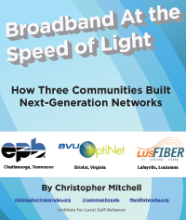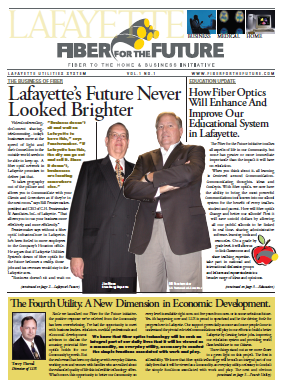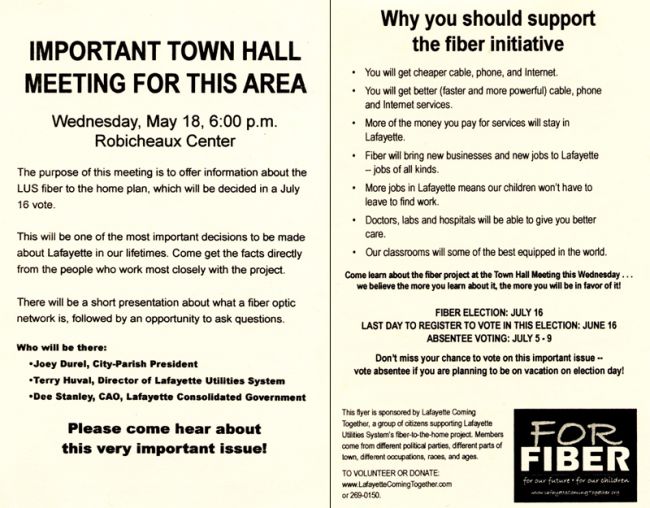
Fast, affordable Internet access for all.

LUS Fiber has released a new ad promoting its HDTV services - probably the best ad I have seen from a community broadband network promoting its services.

LUS Fiber now offers its business subscribers the current ultimate in broadband speeds. An April 5th press release from LUS Fiber reports that business customers of the state's only community-owned ftth network now have access to 1 gig symmetrical internet connections.
The ability to offer such fast speeds in both directions is a big draw to business customers, boosting the potential for economic development. In the press release:
“Gigabit service from LUS Fiber is one of the most robust Internet offerings on the market today,” says Terry Huval, Director of Lafayette Utilities System and LUS Fiber. “We built this community network with a promise to the people of Lafayette that we will work hard to provide them with new opportunities through this unique, state-of-the-art fiber technology…and that’s just what we’ve done.”
We have reported extensively on events surrounding the development of, and contiued corporate attack on, the LUS Fiber system. The local Lafayette Pro Fiber Blog reporter, John, notes how this advancement is rare in the US because the LUS 1 gig service can be offered to all business customers, not just those considered part of a "business core."
John also provides an excellent analysis of how LUS Fiber uses a different customer service approach than traditional ISPs. While he reports on engineering details, he also dicusses a key policy difference between providing the best service and providing any service:
Oversubscription and "best effort" is the name of the game for almost all ISPs and the bandwidth available to the last mile customer is in practice limited: if all subscribers were to use their full bandwidth at once the available speed would drop to a small fraction of the promised bandwidth. LUS has always played that game a different way, minimizing oversubscription and ensuring that even during busy hours of the day the customer's full bandwidth is available. That's in marked contrast to what I used to experience on Cox when the kids in my neighborhood got off the bus.
The battle over broadband in Lafayette is part of a growing number of clashes across the USA that pit municipalities against telecom firms for the right to deliver Web access to homes and businesses. More than 150 local governments across the country have built or are planning to build cyber networks, says Christopher Mitchell of the Washington-based Institute for Local Self-Reliance, a non-profit group that advocates community development and local access to technology. Mitchell says those efforts often draw opposition in the form of misinformation campaigns, lawsuits from private providers or unfavorable state laws resulting from telecom lobbying. Nineteen states either ban cities and counties from getting into the broadband business — or make it difficult.Minor quibble: the Institute for Local Self-Reliance (and particularly my work) is not Washington-based. Like the toy in Crackerjack boxes, we cannot have a story about community networks without at least one blatant lie from some cable company employee. No disappointments here:
"Our initial objection was, and remains, that it is an unfair advantage for your competitor to also be your regulator," says Todd Smith, a Cox spokesman. "Many states prohibit government from competing with the private sector."I challenge Todd Smith to name one way in which LUS Fiber regulates Cox. When the local government makes rules that impact either Cox or LUS Fiber, such rules have to be non-disciminatory or they violate state and federal laws. If incumbents think the community is violating any laws, we know that they know how to hire lawyers and file lawsuits.

This Digital Divide committee is motivated by the vision of our community creating a future in which everyone is both able to and motivated to seize the full power of a fiber optic network. Such a network has the potential to transform the lives of citizens in ways similar to the deployment of electricity, radio, and television. In building its own fiber-optic based utility, Lafayette creates the opportunity for further unifying the people of this community and, potentially, to help bridge current divides among her citizens. A publicly owned network can lower barriers to full and equal participation by making a new and powerful communication technology available to every citizen at the lowest practical cost. In our times, the keys to participation and productivity lie in these rapidly developing technologies. We recognize that if Lafayette is to experience healthy growth and benefit fully from such new technologies, all her people will need to become equal partners in our endeavor. Lowering the barriers to such a partnership and engaging in vigorous and innovative educational efforts will help us realize our community’s full potential. Barriers preventing entry into the world of computers and the World Wide Web include low income, fear or suspicion of technology, a lack of understanding of how useful technology can be, and absence of instruction concerning computers and the Internet. In addition, transportation to places where computers and Internet access are available to the public and knowledge that such places even exist are barriers for some.
 The newsletter also has a word from the Mayor (the inimitable Joey Durel) and quotes the Greater Lafayette Chamber of Commerce Broadband Policy. Finally, it also explains why the Lafayette Utilities System should build the network and cites successes from BVU in Bristol, Virginia.
Groups that are looking for strategies or a template for a web presence should check out Lafayette Coming Together. This was the organizing site they used in building support for the network, as a complement to Lafayette Pro Fiber. Unfortunately, the Fiber Film Festival web page no longer exists, but the most popular video (Slick Sam Slade) is still around - and embedded below.
An old episode examining the arguments around the network is still viewable (for Windows users) via the Louisiana Public Broadcasting archives -- look for episode #2844.
The newsletter also has a word from the Mayor (the inimitable Joey Durel) and quotes the Greater Lafayette Chamber of Commerce Broadband Policy. Finally, it also explains why the Lafayette Utilities System should build the network and cites successes from BVU in Bristol, Virginia.
Groups that are looking for strategies or a template for a web presence should check out Lafayette Coming Together. This was the organizing site they used in building support for the network, as a complement to Lafayette Pro Fiber. Unfortunately, the Fiber Film Festival web page no longer exists, but the most popular video (Slick Sam Slade) is still around - and embedded below.
An old episode examining the arguments around the network is still viewable (for Windows users) via the Louisiana Public Broadcasting archives -- look for episode #2844.

Competitors will pay less for programming than you do, and in turn play hard ball by lowering rates for customers. Good luck keeping up with technological advances, expansion needs and growth costs; it's a risky proposition for a public entity used to maintaining rather than adapting. Your opportunities will be limited because you can't provide services outside the city limits. You'll be criticized for offering programming such as adult movies, and you'll be told you really should be focusing on your core business: running power, water and wastewater plants.Terry Huval delivered that message in 2000, long before Lafayette committed to building their community fiber network -- a network that delivers some of the fastest speeds in the nation at the lowest rates and has already delivered hundreds of jobs. Nonetheless, LUS Fiber is behind the take rate goals they had set in the business plan. The expenses are higher than forecast because Lafayette was unfairly denied entry to a coop that secures lowers rates for television contracts for members. The only discernible reason for rejecting Lafayette is that Cox joined the coop after Lafayette committed to building its network. There is little doubt that Cox was influential in denying Lafayette's application, likely increasing LUS Fiber expenses for offering cable channels by more than 20%. This is just one of the many ways that the telecommunications market is rigged to benefit incumbents at the expense of all of us -- residents and small businesses alike. We will not have real choices in competition until government policy treats telecom like the essential infrastructure it is. Mike Stagg, a long time supporter of the network is quoted in the article, challenging LUS Fiber to improve its marketing:
Can they do better? Probably so. Part of it is the fact that, just from a mindset standpoint, LUS is a utility and utilities generally do not compete," Stagg said.
LUS estimates that the citizens of the community have saved 5.7 million dollars—in part direct saving from LUS' cheaper phone, video, and internet services and in part as a consequence of Cox lowering its prices and giving out special rates. Those special rates were discussed in the meeting with Huval pointing out that Cox had petitioned for and received permission to treat Lafayette as a "competitive" area. That meant that Cox could offer special deals to Lafayette users and, as we all know, has offered cuts to anyone who tries to leave. Those "deals." as Huval pointed out to Patin don't include the rural areas of the parish where Cox has no competition.But it doesn't end there. LUS Fiber, due to anti-competitive laws pushed through the state's legislature to handicap public providers, is actually subsidizing the City -- providing more benefits to everyone, even those who do not subscribe to the network.
Again it all goes back to the (un)Fair Competion Act. One of the things in that act a concession that LUS Fiber would be able to borrow from LUS' other utilities just like any other corporation could set up internal borrowing arrangements. This is not a subsidy, it's a loan—with real interest. One of the efforts to raise an issue by Messrs Patin and Theriot centered around "imputed" taxes. Those are extra costs that Cox and ATT got the state to require that LUS include in order to force LUS to raise their price to customers (you!) above the actual cost. (Yes, really. See this.